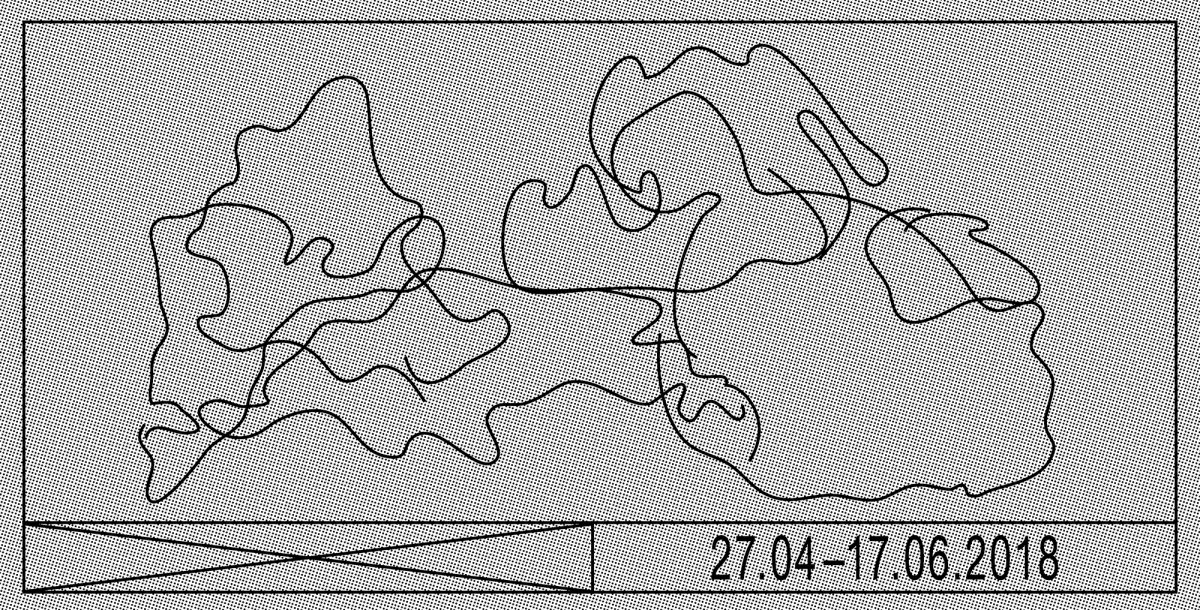
International exhibition series Portable Landscapes with exhibitions in Riga, Paris, New York, Gotland and Berlin is a new research project on art processes within Latvian exile and emigrant communities from the beginning of the 20th century until now days.
The contemporary art project Portable Landscapes examines the stories of exiled and emigré Latvian artists, locating them within the broader context of 20th-century art history, and wider processes of migration and globalization. Focusing its attention on the major centres of the Latvian Diaspora – Paris, New York, (former) West Berlin and Gotland – Portable Landscapes is an attempt to relate individual stories of migration to a common network, as well as to create an understanding of our current situation that’s informed by these historical occurrences.
From 2017 to 2019, the Latvian Centre for Contemporary Art works with a wide range of international institutions, researchers, curators and artists to create four satellite exhibitions in Paris, New York, Stockholm and Berlin and an exhibition that combines all the individual stories at the Latvian National Museum of Art in Riga.
Each of the satellite exhibitions will centre on a personality or a group of people whose life and work reveal a specific period in the history of Latvia, as well as say something about that period’s relationship to the current situation, and to the international context. The Berlin exhibition will focus on Valdis Āboliņš – one of the most important promoters of Latvian art in the West, a leftist intellectual and a mail artist whose efforts to create and strengthen the cultural ties between West Berlin and Riga open up a lot of complex questions. A highlight of the story of Latvian artists in New York is “Hell’s Kitchen” – an informal group of poets and artists that served as a significant driving force of the international intellec¬tual exile milieu, as well as a catalyst for the survival of the creative potential of Latvian culture during 1950s and 1960s. In Paris, special attention will be paid to the personality of the dancer and publicist Aia Bertrand, who, together with her husband, the American dancer and artist Raymond Duncan, ran the alternative education institution Akademia in Paris from the 1920s until the 1970s. The Gotland story will centre on painter’s Laris Strunke art practice and experience as refugee during World War II when he with his family escaping Red Army illegally crossed Baltic Sea to reach Gotland.
Alongside archival materials and works by the historic personalities of the Latvian exile, the exhibitions will also include work by artists from Latvia and abroad who are dealing with the topics of migration and exile from different angles. Portable Landscapes will be a unique opportunity to introduce Latvian artists who have been living abroad to Latvian society, as well as to broaden our knowledge of recent history as it relates to one of the world’s most urgent concerns – migration.
Migration is often discussed in terms of the changes in identity caused by the overlapping of cultures, by new combina¬tions of cultural characteristics. Portable Landscapes serves as a reference to both idealized images of the homeland, as well as those distinguishing marks of the urban environment and those strong political beliefs that often accompany migrants to their new homes, and which characterize the changes that can occur during the migration process.
Project’s program:
Exhibitions:
13.01.-24.03.2018.
Venue: Villa Vassilieff, Paris, France
27.04. -17.06.2018.
Portable Landscapes
Venue: Latvian National Museum of Art, Riga, Latvia
04.08.- 30.09.2018.
Portable Landscapes. Sweden
Venue: Körsbärsgården Konsthall, Gotlande, Swedan
20.06. - 27.07.2019.
Portable Landscapes: Unweaving the Iron Curtain
Venue: District Berlin, Berlin, Germany
14.11.2019.-17.01.2020.
Portable Landscapes. New York.
Venue: James Gallery of the CUNY Graduate Center, New York, USA
Past events:
18. 04. 2017.
Discussion-workshop. Island of Freedom: Berlin.
Venue: Goethe-Institut Riga, Riga, Latvia
Participants: Elske Rozenfeld (DE), Susanne Husse (DE), Leonards Laganovskis (LV), Ieva Astahovska (LV), Antra Priede (LV).
15. 06. 2017.
Discussion-workshop. Paris. Migration, multiple encounters and art histories.
Venue: Latvian Centre for Contemporary Art, Riga, Latvia
Participants: Aija Brasliņā (LV), Mélanie Bouteloup (FR), Sumesh Sharma (IN), Inga Lāce (LV)
7.12.2017.
Discussion-workshop. Island of Hope. Gotland – The Baltic Sea's Geopolitical Centre of Gravity
Venue: Latvian Centre for Contemporary Art, Riga, Latvia
Participants: Helena Selder (SE), Ingela Johansson (SE), Jānis Krēsliņš (SE/LV), Diana Popova (LV).
19.12.2017.
Discussion-workshop. New York. Creative climate after the World War II. Cultural connections and artist networks.
Venue: Latvian Centre for Contemporary Art, Riga, Latvia
Participants: Melissa Rachleff Burtt (USA), Ana Janevski (USA), Katherine Carl (USA), Kārlis Vērdiņš (LV), Andra Silapētere (LV).
Organized by the Latvian Centre for Contemporary Art
Curators: Solvita Krese, Inga Lāce, Antra Priede, Diāna Popova, Andra Silapētere
Exhibition Design: Asnate Bočkis
Graphic Design: Kārlis Krecers, Rudy Guedj
Project Director: Andra Silapētere
Head of Communications: Marta Krivade
Portable Landscapes is one of the events of the Latvia’s Centenary Celebrations.
Portable Landscapes is supported by Latvian Culture ministry, State Culture Capital foundation, Baltic Art Centre (BAC), British Council Latvia, Swiss Arts Council Pro Helvetia, Frame Contemporary Art Finland, Iaspis Swedish Arts Grants Committee's international programme for Visual and Applied Artists, Embassy of Canada, Embassy of US, Embassy of Sweden, The Goethe Institute in Riga. Latvia’s Centenary celebrations take place from 2017 to 2021. The central message of the centenary celebrations is “I am Latvia” emphasizing that the main value of Latvia is its people that create its present with their everyday work and build the basis for its future together with the new generation.